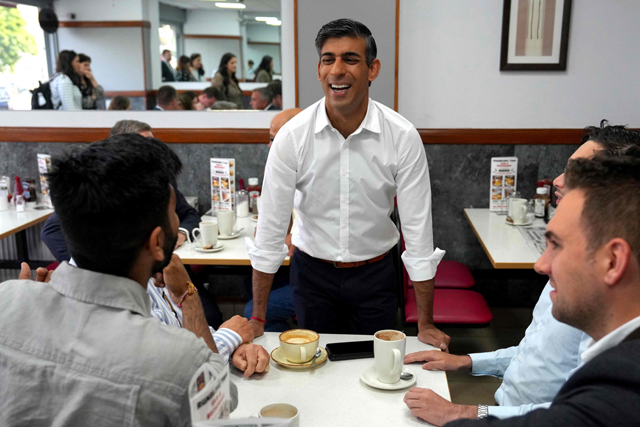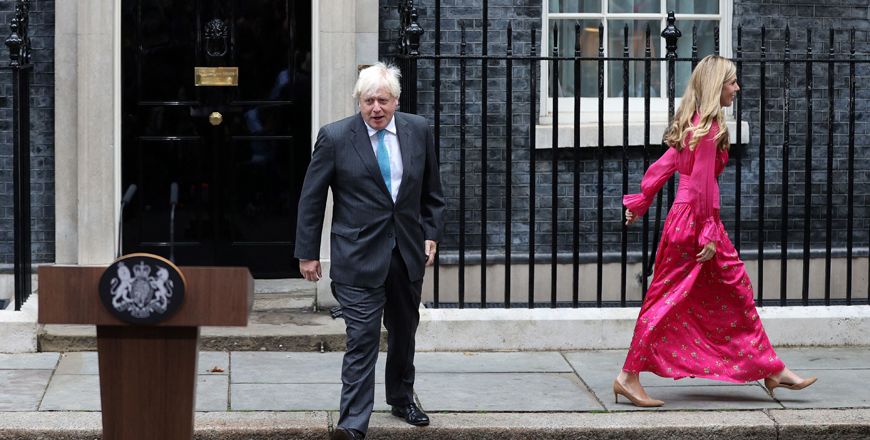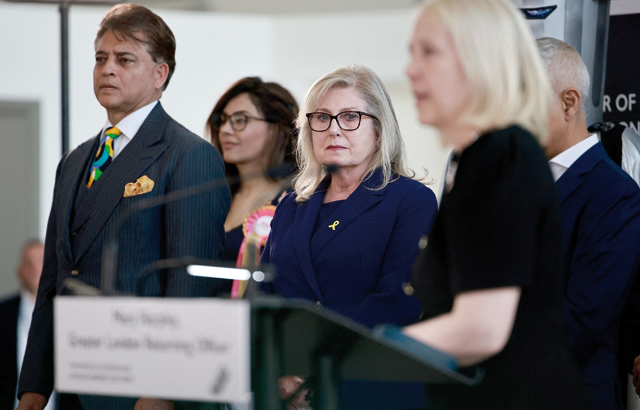You are here
Ruling UK Conservatives suffer vote routs but avoid wipeout
By AFP - Jul 22,2023 - Last updated at Jul 22,2023

Britain’s Prime Minister Rishi Sunak addresses Conservative party members and supporters at a cafe in Ruislip, on Friday (AFP photo)
LONDON — Britain’s ruling Conservatives on Friday held the former seat of ex-Prime Minister Boris Johnson, but saw hefty majorities in two other constituencies evaporate as voters responded to scandals during his tenure and high inflation.
Rishi Sunak had been expected to become the first prime minister in decades to lose three parliamentary seats in one day. He was spared that humiliation thanks to a narrow victory in the northwest London seat of Uxbridge and South Ruislip.
That result, driven by opposition to Labour mayor Sadiq Khan’s contentious expansion of a vehicle pollution tax to outer London, offered the embattled Tory leader some relief.
But the erasure of his party’s 19,000 majority in the Somerton and Frome seat in southwest England, and its 20,000 majority in the Selby and Ainsty constituency in the northeast, represent bitter blows ahead of an expected general election in 2024.
“By-elections midterm for an incumbent government are always difficult, they rarely win them,” Sunak told reporters on Friday morning, while visiting Uxbridge and South Ruislip.
“The message I take away is that we’ve got to double down, stick to our plan and deliver for people... and earn people’s trust for the next election.”
But his Conservatives face defeat nationally next year if Thursday’s results are repeated.
Labour took the seat of Selby and Ainsty by 16,456 votes to 12,295, in what its leader Keir Starmer said was the biggest-ever swing to the party in its history.
“We hear that cry for change away from the chaos, away from those rising bills, the crumbling public services,” he told supporters during a victory visit there on Friday.
‘Stunning’
Ex-Tory MP Nigel Adams had prompted the vote when he quit after failing to be nominated for a peerage last month.
In Somerton and Frome, the Liberal Democrats comfortably won with an even bigger shift from the Conservatives, the latest in a series of by-election wins in recent years.
The contest was held after its former Tory MP David Warburton stood down after admitting cocaine use.
The Uxbridge and South Ruislip by-election was triggered after the scandal-tarred Boris Johnson also resigned as a lawmaker last month.
He quit after learning that a cross-party parliamentary committee had concluded he had deliberately lied to lawmakers about lockdown-breaking parties during the COVID pandemic, and recommended a 90-day suspension.
Sunak’s Tories had been expected to lose his seat, but won by less than 500 votes, delivering a blow to Starmer and Khan.
Winning candidate Steve Tuckwell said the “number one” issue had been the mayor’s expansion of the tax on polluting vehicles.
Labour MPs in similar seats “will now be panicking”, he said.
Election experts were sceptical, however.
“It would seem unwise for Tory MPs to draw any conclusion other than that their party is still in deep electoral trouble,” Strathclyde University’s John Curtice wrote in an analysis for the BBC.
Sunak struggles
The heavy defeats in the other two contests leave Sunak increasingly vulnerable, with parliament’s six-week summer break starting on Friday providing welcome relief.
Labour is currently enjoying double-digit poll leads and is poised to retake power for the first time in over a decade.
Sunak became prime minister following the disastrous 44-day tenure of predecessor Liz Truss and initially succeeded in stabilising financial markets panicked by her radical tax-slashing agenda.
But the 43-year-old former finance minister has struggled to reverse his party’s declining fortunes, which first set in during the so-called “Partygate” scandal under Johnson.
Sunak’s turnaround efforts have in part been hobbled by persistently high inflation, which in recent months has spooked the markets once again.
With interest rates at their highest in 15 years, pushing mortgage and other borrowing costs ever higher, the worst cost-of-living crisis in a generation is showing few signs of abating.
Sunak kicked off the year by making five key vows to voters, including halving inflation, growing the economy and cutting waiting times at the overstretched National Health Service.
He has made little headway on most of the pledges, and there are persistent fears the UK will tip into recession this year as the high interest rates constrain spending.
Sunak’s net favourability has fallen to its lowest level (-40) since he entered Downing Street, with two-thirds of Britons saying they have an unfavourable view of him, according to YouGov.
Related Articles
LONDON — Former British prime minister Boris Johnson's angry departure from parliament over Covid lockdown-breaking parties sparked fevered
LONDON — Britain’s ruling Conservatives on Saturday suspended their former deputy chairman from the parliamentary party, after he refused to
LONDON — Britain's ruling Conservatives braced Saturday for further losses in local elections, their worst results in recent memory and a ke


















